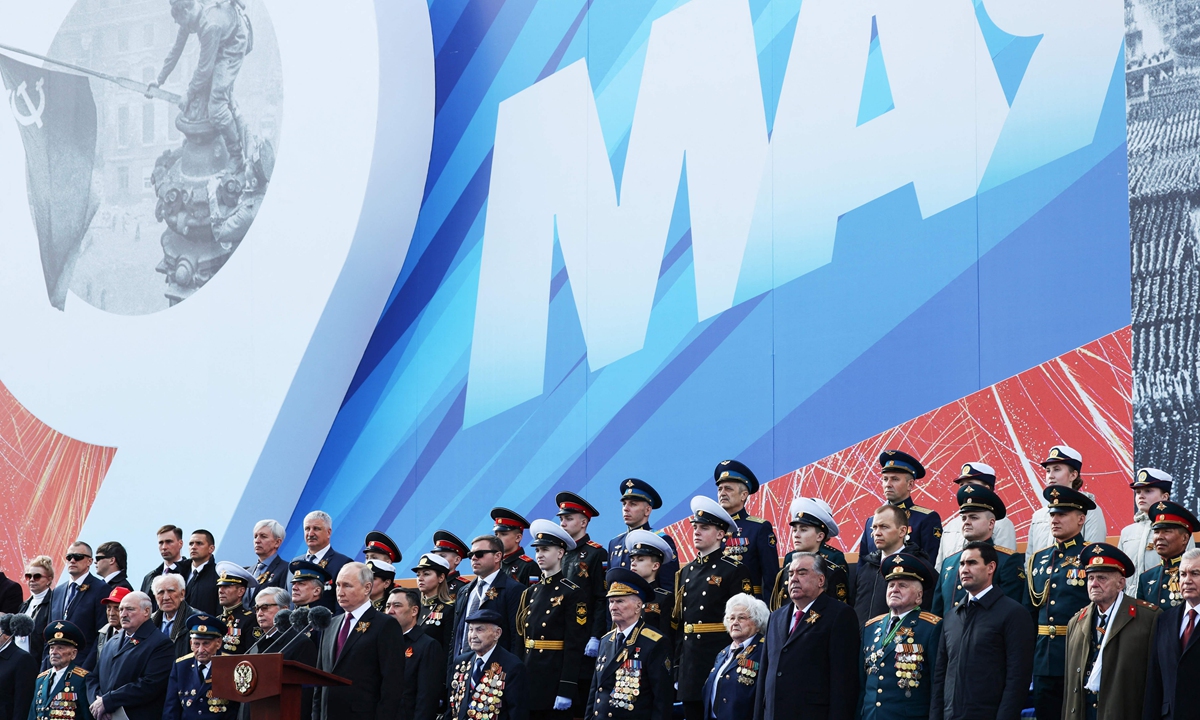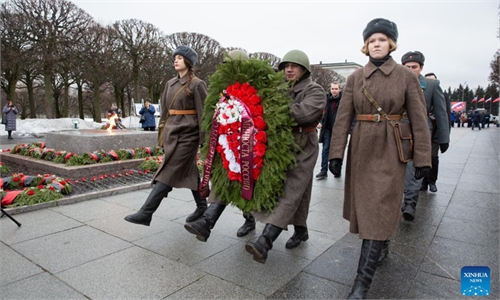In current global environment, it is more important to adhere to correct WWII view

Russian President Vladimir Putin gives a speech during the Victory Day military parade at Red Square in central Moscow on May 9, 2023. Russia is celebrating the 78th anniversary of victory over Nazi Germany during World War II. Photo: VCG
The Russian Federation held its annual Victory Day parade in Moscow on May 9. In his speech, Russian President Vladimir Putin, apart from praising the achievements of the Soviet Union's military and civilians during World War II (WWII), paid tribute to the troops of the allied armies of the US and Britain and other countries, saying that "we remember and honor the feat of Chinese soldiers in the fight against Japanese militarism."In contrast, this year's commemoration of the victory over the Nazis was lukewarm in the US, with a White House spokesperson only praising the victory of the US, British and other allied powers over fascism, without any words mentioning the role of the Soviet Union.
Such a historical view of WWII held by the US-led West reflects its consistently prominent "Western-centrism" and the persistence of its Cold War mentality. People who face up to history and try to maintain the fruits of victory in the Anti-Fascist War should certainly oppose such an attitude.
Looking back at Germany's surrender in 1945, the Flensburg government under Karl Dönitz, formed following the suicide of Adolf Hitler, catered to the Western anti-communist mentality and wanted to surrender to the Western powers but not the Soviet Union. This led to the signing of the surrender by German representatives twice in two places and on two days, and, as a result, the emergence of two "Victory Days": May 8 was regarded as "Victory in Europe Day" in Western Europe, while May 9 became "Victory Day in the 1941-1945 Great Patriotic War" for the Soviet Union and its successor, the Russian Federation.
The West's conceited double standards have led it to constantly change its attitude toward Russia's Victory Day. At the end of the war against Nazi Germany, the US and Britain exalted themselves and belittled the Soviet Union's role in the war. The West has always been "selectively blind" in its approach to WWII history: It ignores the UK and France's appeasement policy toward Germany and the Munich Agreement, only focusing on some dark sides of the Soviet Union in the war and exaggerating them.
After the collapse of the Soviet Union, the US and Western Europe enjoyed a period of improved relations and enhanced cooperation with Russia, so they had a somewhat positive view of the Soviet Union's role in fighting the Nazis. During their presidency, Bill Clinton and George W. Bush went to Moscow for Victory Day celebrations and parades in 1995 and 2005, respectively.
But the US' global strategy changed after the end of the War on Terror in 2021. As a result, the country further discredited the Soviet Union's role in WWII. Such a flip-flop in interpreting history is a striking manifestation of how Western political and public opinion circles manipulate the discourse for self-interest.
To properly view WWII history, we must focus on who played the greatest role in the Anti-Fascist War. An objective and unbiased look at the war in Europe shows that the Soviet Union made the greatest sacrifice, with 27 million dead, including 8.7 million military and 19 million civilian deaths, according to figures published in 1991. Similarly, the Soviet Union killed the most German troops, while the US participated in the war in Europe only after acting for long as a mere spectator.
The West has long doubted the WWII causalities declared by the Soviet Union. Using its hegemony in discourse, it has always distorted the fact that the Soviet Union was, indeed, the main force against German fascism, in an attempt to influence international opinion.
How people look back at history always serves reality. The current international order is still partly shaped by the results of WWII. Since people who defend justice often emphasize the need to preserve the victorious outcomes of the Anti-Fascist War, they have to oppose the glorification and revival of Nazism and militarism resolutely.
In recent years, the US has not only misinterpreted WWII history, but also increasingly downplayed the commemoration of the Anti-Fascist War to strengthen the hegemonic order under its leadership. Therefore, by celebrating the victory of the Anti-Fascist War and remembering history, we can effectively promote international justice and equity to defend the peace and stability of the world.
The author is a retired PLA major general and currently a military history expert. opinion@globaltimes.com.cn

